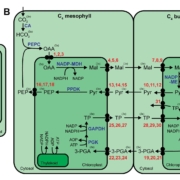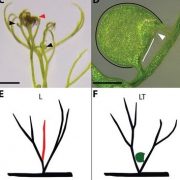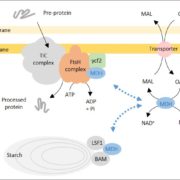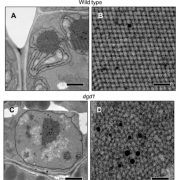Rewiring of the fruit metabolome in tomato breeding
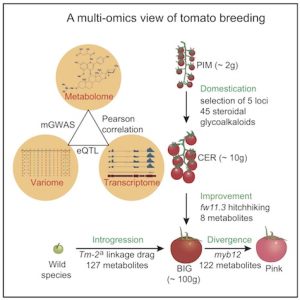 Cell. The tomato plant has been of keen interest to mankind for centuries, and its domestication led to delicious fruits much larger than their wild, bitter-tasting ancestors. Domestication of tomato had many intended outcomes (increased fruit size, less bitter taste), and several unintended consequences. A recent study published in Cell by Zhu et al. reported that selective breeding of tomato had major effects on its metabolic component, or metabolome, which includes all molecules responsible for taste, smell, and nutritional content of the fruit. Constant selection for better tasting fruits led to a significant decrease in steroidal glycoalkaloids (SGAs), a bitter-tasting metabolite. However, SGAs have potent disease resistance properties, therefore leading humans to inadvertently breed plants more susceptible to disease. The selection for larger fruit could also have led to the “hitch-hiking” of genes responsible for metabolites that adversely affect flavour and nutritional content. The authors propose that these unintended consequences may be rectified with the advent of precision molecular breeding techniques, and that metabolome-targeted breeding (breeding using metabolic and chemical level information) may replace traditional phenotype-targeted breeding (breeding for physical traits such as fruit size and taste), enhancing the highest-value fruit and vegetable crops world-wide (Summary by Danielle Roodt Prinsloo) Cell. 10.1016/j.cell.2017.12.019
Cell. The tomato plant has been of keen interest to mankind for centuries, and its domestication led to delicious fruits much larger than their wild, bitter-tasting ancestors. Domestication of tomato had many intended outcomes (increased fruit size, less bitter taste), and several unintended consequences. A recent study published in Cell by Zhu et al. reported that selective breeding of tomato had major effects on its metabolic component, or metabolome, which includes all molecules responsible for taste, smell, and nutritional content of the fruit. Constant selection for better tasting fruits led to a significant decrease in steroidal glycoalkaloids (SGAs), a bitter-tasting metabolite. However, SGAs have potent disease resistance properties, therefore leading humans to inadvertently breed plants more susceptible to disease. The selection for larger fruit could also have led to the “hitch-hiking” of genes responsible for metabolites that adversely affect flavour and nutritional content. The authors propose that these unintended consequences may be rectified with the advent of precision molecular breeding techniques, and that metabolome-targeted breeding (breeding using metabolic and chemical level information) may replace traditional phenotype-targeted breeding (breeding for physical traits such as fruit size and taste), enhancing the highest-value fruit and vegetable crops world-wide (Summary by Danielle Roodt Prinsloo) Cell. 10.1016/j.cell.2017.12.019



